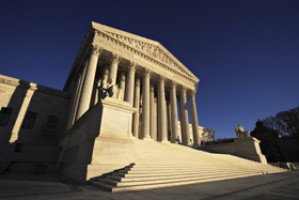Supreme Court will decide standard for proving racial bias in discrimination suit against Comcast

Image from Shutterstock.com.
The U.S. Supreme Court agreed Monday to decide whether a black-owned media company has to show but-for causation in its Section 1981 discrimination suit against Comcast for failing to carry its programming.
The court agreed to decide the issue in the case of Entertainment Studios Networks. The company alleges that Comcast Corp. has refused to carry any of the network’s channels for more than seven years, even as Comcast launched more than 80 lesser-known, white-owned channels. “For years, Comcast has given Entertainment Studios the run-around,” the company says its brief opposing certiorari.
Entertainment Studios alleges discrimination in contract in violation of Section 1981 of the Civil Rights Act, a Reconstruction-era law. In a ruling for Entertainment Studios, the 9th U.S. Circuit Court of Appeals at San Francisco said the company only has to show that discrimination was a “motivating factor” in Comcast’s refusal to contract.
Comcast says in its petition for certiorari that at least five federal appeals courts have reached contrary decisions. “And for good reason: Nothing in the text of the statute purports to displace the common-law rule requiring but-for causation,” the cert petition says.
Comcast pointed out that Congress permitted “motivating factor” discrimination claims under Title VII of the Civil Rights Act but didn’t add a similar provision to Section 1981.
The brief for Entertainment Studios counters that Congress added the provision to Title VII to protect discrimination victims, and that doesn’t mean that Congress intended to narrow civil rights claims under Section 1981.
Entertainment Studios also says the federal appellate decisions cited by Comcast didn’t address burdens at the pleading stage.
Comcast is represented by Miguel Estrada of Gibson, Dunn & Crutcher. Entertainment Studios is represented by Erwin Chemerinsky, dean at the University of California at Berkeley School of Law. Chemerinsky is also a regular ABA Journal contributor.
USA Today, Reuters, the Hollywood Reporter and Think Progress have coverage of the Supreme Court’s decision to hear the case, Comcast Corp. v. National Association of African American-Owned Media.
The SCOTUSblog case page is here.
Write a letter to the editor, share a story tip or update, or report an error.


